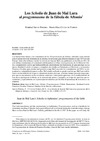Identificador persistente para citar o vincular este elemento:
https://accedacris.ulpgc.es/jspui/handle/10553/55816
| Campo DC | Valor | idioma |
|---|---|---|
| dc.contributor.author | Arcos Pereira, Trinidad | en_US |
| dc.contributor.author | Cuyás de Torres, María Elisa | en_US |
| dc.date.accessioned | 2019-06-18T15:49:15Z | - |
| dc.date.available | 2019-06-18T15:49:15Z | - |
| dc.date.issued | 2008 | en_US |
| dc.identifier.issn | 1131-9062 | en_US |
| dc.identifier.other | Dialnet | |
| dc.identifier.uri | https://accedacris.ulpgc.es/handle/10553/55816 | - |
| dc.description.abstract | Las traducciones latinas y los comentarios de los Progymnasmata de Aftonio, utilizados como manual para el primer nivel de enseñanza de la retórica, tuvieron una gran difusión durante el siglo XVI en toda Europa. Entre ellos debemos incluir los Scholia de Juan de Mal Lara, publicados en Sevilla en 1567. En este trabajo estudiaremos el comentario del humanista sevillano al progymnasma de la fábula de Aftonio, comparándolo con los que habían publicado anteriormente tres humanistas de gran prestigio en esa época: Reinhard Lorich, su amigo y compañero de estudios en Salamanca, el Brocense, y... (Leer más) su maestro, Francisco Escobar, para mostrar qué posición ocupa Mal Lara entre los comentaristas del XVI y su dependencia y originalidad respecto a ellos. Del estudio realizado se puede concluir que Mal Lara está inmerso en una tradición de la que es claramente deudor, pero que, al mismo tiempo, presenta rasgos propios que no encontramos en los escoliastas anteriores, como puede apreciarse en el establecimiento de una nueva tipología de la fábula, en la selección de autores y ejemplos, en el tipo de ejercicios que recomienda y, especialmente, en su preocupación didáctica por facilitar el aprendizaje de la retórica a sus alumnos. | en_US |
| dc.description.abstract | The Latin translations and the commentaries to Aphthonius’ Progymnasmata, used as a handbook for elementary teaching of rhetoric, had a great diffusion all over Europe during the sixteenth century. Among these we have Juan de Mal Lara’s Scholia, published in Seville in 1567. In this paper we will study the commentary of this humanist from Seville to Aphthonius’ Progymnasmata of the fable and will compare it to the ones published formerly by three humanists who enjoyed a great prestige at the moment: Reinhard Lorich, his friend and classmate in Salamanca, the Brocense, and his master, Francisco Escobar, in order to establish Mal Lara’s position among the sixteenth-century commentators, his dependence and originality. Our work allows us to conclude that, although Mal Lara is definitely indebted to the tradition, he also presents particular features absent in the former scholiasts such as the proposal of a new typology of the fable, his selection of authors and examples, the type of recommended exercises and, especially, his pedagogic concern for facilitating the learning of rhetoric to his students. | en_US |
| dc.language | spa | en_US |
| dc.relation.ispartof | Cuadernos de filología clásica. Estudios latinos | en_US |
| dc.source | Cuadernos de filología clásica: Estudios latinos [ISSN 1131-9062], v. 28 (1), p. 115-137 | en_US |
| dc.subject | 620205 Retórica | en_US |
| dc.subject.other | Juan de Mal Lara | en_US |
| dc.subject.other | Aftonio | en_US |
| dc.subject.other | Progymnasmata | en_US |
| dc.subject.other | Fábula | en_US |
| dc.subject.other | Humanismo | en_US |
| dc.subject.other | Reinhardus Lorichius Hadamarius | en_US |
| dc.subject.other | Francisco Escobar | en_US |
| dc.subject.other | Francisco Sánchez de las Brozas | en_US |
| dc.subject.other | el Brocense | en_US |
| dc.subject.other | Fable | en_US |
| dc.subject.other | Humanism | en_US |
| dc.title | Los Scholia de Juan de Mal Lara al "progymnasma" de la fábula de Aftonio | en_US |
| dc.title.alternative | Juan de Mal Lara’s Scholia to Aphtonius’ progymnasma of the fable | en_US |
| dc.type | info:eu-repo/semantics/Article | en_US |
| dc.type | Article | en_US |
| dc.identifier.isi | 000422457600007 | |
| dc.identifier.url | http://dialnet.unirioja.es/servlet/articulo?codigo=2722925 | - |
| dc.description.lastpage | 137 | - |
| dc.identifier.issue | 1 | - |
| dc.description.firstpage | 115 | - |
| dc.relation.volume | 28 | - |
| dc.investigacion | Artes y Humanidades | en_US |
| dc.type2 | Artículo | en_US |
| dc.contributor.daisngid | 8441500 | |
| dc.contributor.daisngid | 4654267 | |
| dc.contributor.authordialnetid | 161290 | - |
| dc.contributor.authordialnetid | 184646 | - |
| dc.identifier.dialnet | 2722925ARTREV | - |
| dc.contributor.wosstandard | WOS:Pereira, TA | |
| dc.contributor.wosstandard | WOS:de Torres, MEC | |
| dc.date.coverdate | 2008 | |
| dc.identifier.ulpgc | Sí | es |
| dc.description.sellofecyt | Sello FECYT | |
| dc.description.esci | ESCI | |
| dc.description.erihplus | ERIH PLUS | |
| item.grantfulltext | open | - |
| item.fulltext | Con texto completo | - |
| crisitem.author.dept | GIR IATEXT: Filología Clásica "Juan de Iriarte" | - |
| crisitem.author.dept | IU de Análisis y Aplicaciones Textuales | - |
| crisitem.author.dept | Departamento de Filología Hispánica, Clásica y de Estudios Árabes y Orientales | - |
| crisitem.author.dept | GIR IATEXT: Filología Clásica "Juan de Iriarte" | - |
| crisitem.author.dept | IU de Análisis y Aplicaciones Textuales | - |
| crisitem.author.orcid | 0000-0002-9153-4029 | - |
| crisitem.author.orcid | 0000-0001-5824-919X | - |
| crisitem.author.parentorg | IU de Análisis y Aplicaciones Textuales | - |
| crisitem.author.parentorg | IU de Análisis y Aplicaciones Textuales | - |
| crisitem.author.fullName | Arcos Pereira, Trinidad | - |
| crisitem.author.fullName | Cuyás De Torres,María Elisa | - |
| Colección: | Artículos | |
Citas de WEB OF SCIENCETM
Citations
10
actualizado el 25-feb-2024
Visitas
282
actualizado el 15-ene-2026
Descargas
181
actualizado el 15-ene-2026
Google ScholarTM
Verifica
Comparte
Exporta metadatos
Los elementos en ULPGC accedaCRIS están protegidos por derechos de autor con todos los derechos reservados, a menos que se indique lo contrario.
